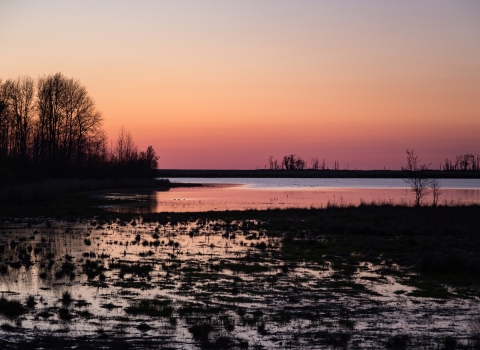The U.S. Fish and Wildlife Service (Service) today released an analysis that estimates the cost related to the revised proposed critical habitat for the Comal Springs dryopid beetle, Comal Springs riffle beetle and Peck’s cave amphipod over the next 20 years. In addition, the Service is announcing the reopening of the comment period for 30 days to allow all interested parties the opportunity to comment on the draft economic analysis, the amended determinations sections and the revised proposed critical habitat rule.
The Service will hold a public informational meeting followed by a public hearing on Friday, May 17, 2013, at the San Marcos Activity Center. The informational meeting will be held from 5:30 p.m. - 6:30 p.m. followed by a break and then the public hearing will be held from 7:00 p.m. – 8:30 p.m.
On October 19, 2012, the Service proposed revised critical habitat for the three endangered Comal invertebrates. The Service is proposing approximately 169 acres in four units in Comal and Hays Counties, Texas.
Critical habitat is a term in the Endangered Species Act that identifies geographic areas containing features essential for the conservation of a threatened or endangered species, and which may require special management considerations or protection. Designation of critical habitat does not affect land ownership, establish a refuge or preserve and has no impact on private landowners taking actions on their land that do not require federal funding or permits.
When specifying an area as critical habitat, the Endangered Species Act requires the Service to consider economic and other relevant impacts of the designation. If the benefits of excluding an area outweigh the benefits of designating it, the Secretary may exclude an area from critical habitat, unless that would jeopardize the existence of a threatened or endangered species.
The draft economic analysis quantifies economic impacts of the conservation efforts for the three Comal invertebrates associated with the following categories of activity if these activities are federally assisted or carried out: changes to existing flow regimes; introduction or augmentation of nonnative species; and physical, biological, or chemical changes to the proposed revised critical habitat area. Total present value impacts anticipated to result from the critical habitat designation of all units for the three Comal invertebrates is $14,000 for water use actions and $57,000 for other actions over a 20 year period.
All three Comal species are freshwater invertebrates found in spring systems – Comal, San Marcos, Hueco, and Fern Bank – associated with the Edwards Aquifer, one of the most prolific artesian aquifers in the world. The Trinity Aquifer may also provide some water to these spring systems, especially at Fern Bank Springs. The Comal Springs dryopid beetle and the Comal Springs riffle beetle are found in both Hays and Comal Counties. The Peck’s cave amphipod is only found in Comal County.
Comments on the revised proposed critical habitat will be accepted until June 3, 2013, and may be submitted by one of the following methods:
(1) Electronically: Go to the Federal eRulemaking Portal: http://www.regulations.gov. Search for Docket No. FWS–R2–ES–2012–0082, which is the docket number for this rulemaking, and follow the directions for submitting a comment.
(2) By hard copy: Submit comment on the listing proposal by U.S. mail or hand-delivery to: Submit by U.S. mail or hand-delivery to: Public Comments Processing, Attn: FWS–R2–ES–2012–0082; Division of Policy and Directives Management; U.S. Fish and Wildlife Service; 4401 N. Fairfax Drive, MS 2042–PDM; Arlington, VA 22203.
For additional information, contact Adam Zerrenner, Field Supervisor, U.S. Fish and Wildlife Service, Austin Ecological Services Field Office, 10711 Burnet Road, Suite 200, Austin, TX 78758; by telephone at 512-490-0057, extension 248; or by fax at 512-490-0974. Persons who use a telecommunications device for the deaf (TDD) may call the Federal Information Relay Service (FIRS) at 800–877–8339.
America’s fish, wildlife and plant resources belong to all of us, and ensuring the health of imperiled species is a shared responsibility. The Service is actively engaged with conservation partners and the public in the search for improved and innovative ways to conserve and recover imperiled species. To learn more about the Endangered Species program, go to http://www.fws.gov/endangered/.



